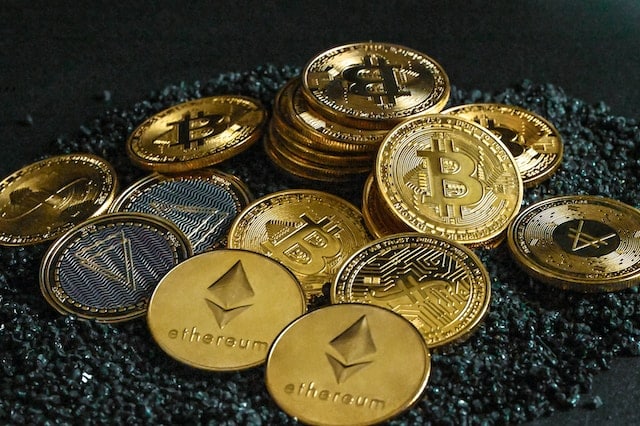A completely functional economy inside the virtual world where you can trade any virtual assets has been created thanks to cryptocurrencies and NFTs. A select few individuals have already been successful in making large sums of money through the sale of digital artwork, virtual properties, and other items. Unsurprisingly, a lot of specialists are very interested in this field and are adamant that blockchain and metaverses will transform the Internet and the digital world.
Blockchain technology has a big part to play in the metaverse because it makes it possible for virtual assets, transactions, and identity management to be owned securely and decentralized. Blockchain app development cannot be classed as a decentralized application, even though blockchain technologies are frequently built on decentralized networks. dApp blockchain application development enables enterprises to govern their own digital assets and data.
By enabling the production and exchange of distinctive digital assets as well as safe peer-to-peer transactions between participants in the metaverse, blockchain can also help to support a decentralized economy. In addition, by facilitating transparent and auditable transactions and guaranteeing data privacy and security, blockchain can aid in building trust and security inside the metaverse.

Is the Metaverse’s Secret Code Cryptography?
In many aspects, the Metaverse aims to surpass physical reality in terms of experiences and opportunities by offering people an augmented reality experience.
Let’s look at why encryption is necessary for the proper operation of the metaverse.
Blockchain’s immutability and un-hackability are essential features for any virtual reality system to find widespread adoption. Although hacks and data breaches are frequent, the platform on which people will be operating in an entirely online and virtual environment must be secure.
Blockchain not only enables quick information confirmation, but it also enables safeguarded and cryptographically secure transactions. Virtual reality will be used in a fundamentally new way that includes blockchain technology and digital currency.
Continuing from the preceding point, the Metaverse will want and need transactions to be finished immediately, which blockchain technology and digital currency will help to make possible. Transactions are necessary for a virtual reality environment to function and behave as promised. In a virtual ecosystem like the metaverse, crypto-enabled payments grew even more common. Thus, it makes sense that they will become more prominent in the future.
The field of the metaverse is still in development and is growing quickly. However, the fact remains that blockchain technology and digital currency will have to be a significant part of the metaverse’s implementation in the future if it is to be supported and realized.

Why Blockchain is the Metaverse’s Core Technology
The fundamental operating principles of the blockchain ecosystem have already been devised, even though there is still no singular notion of the metaverse, and the concept itself is only partially implemented in initiatives like the metaverse Facebook Horizon and Google Blocks.
Hardware and software are the two major parts of any metaverse. Users may comfortably engage with virtual or augmented reality thanks to the hardware component, which incorporates all common controller kinds. In the case of software, we’re referring to a digital setting where the user has access to content.
Once you consider the most crucial aspects of blockchain technology, it becomes quite clear that it can satisfy the needs of the metaverse. They are listed below:
Security
The exabyte-scale data storage of the metaverse presents concerns about secure transmission, synchronization, and storage. In this view, the decentralization of data processing and storage nodes makes blockchain technology extremely pertinent.
Trust
Blockchain requires the existence of tokens, which are safe storage units capable of conveying things like encrypted personal data, virtual content, and authorization keys. Because sensitive data won’t be accessible to outside parties, the metaverse blockchain fosters greater user confidence in the ecosystem.
Decentralization
All participants must see the same virtual reality for the metaverse to function properly. Blockchain-based decentralized ecosystems enable thousands of independent nodes to synchronize.
Smart Contracts
Through these, relationships between ecosystem participants within the metaverse can be effectively regulated in terms of economic, legal, social, and other factors. Additionally, smart contacts let you create and put into action the fundamental guidelines for the metaverse’s governance.
Interoperability
Blockchain makes it possible for numerous systems and interfaces to work together seamlessly and interoperably. When it comes to NFT valuation, this is very important.
Finance Relations
Because it is an essential component of the blockchain, cryptocurrency can function as a reliable substitute for fiat currency. It is also a useful tool for performing settlements between parties in the metaverse.
Is Blockchain Really Necessary to Create the Metaverse?
Yes. Blockchain technology is essential to the metaverse because it allows users to safeguard their digital assets in virtual reality. Real blockchain initiatives like “Axie Infinity” and “The Sandbox” emphasize this concept. They both concern the metaverse. By using the metaverse cryptocurrency, users can build and trade NFTs, as well as profit from the local economy.
Without blockchain technology, experts agree that the concept of a fully functional virtual ecosystem cannot be realized. This is due to the fact that, as we’ve mentioned, consumers must be allowed to safely own and sell their digital property by transferring assets between the platforms without a centralized authority’s consent.
The Top 5 Cryptocurrency and Blockchain Initiatives in the Metaverse
Here are the top use cases of cryptocurrency and blockchain that you ought to know:
The Sandbox
This NFT game is currently quite well-liked. It started off as a simple mobile app but, over time, transformed into a sophisticated Ethereum-based metaverse with a unique SAND token. In order to manage non-fungible tokens, an internal currency (SAND), and a variety of other assets, users create an avatar connecting it to an e-wallet. The game incorporates a “play-and-earn” approach meant to boost the local economy even more.
Decentraland
Users can create avatars, purchase and equip land plots, plan different events, and produce digital material in this 3D metaverse. The blockchain, which permits digital identification and ownership confirmation of in-game goods, powers the home economy of Decentraland. Virtual real estate (LAND) is the primary digital resource in the game. Additionally, the metaverse has a native ERC-20 cryptocurrency token (MANA) that is used internally by the players for settlement.
Star Atlas

One of the most recent creations integrating blockchain technology from the metaverse and DeFi is called “Star Atlas” in the metaverse. Players of “Star Atlas” can buy virtual resources, including land, spacecraft, gear, and crew. The foundation of the in-game economy, the POLIS monetary system, has also been unveiled.
Enjin
Enjin is a distinctive application of the metaverse idea. It uses the blockchain as its operating system, but it also provides chances for software development and SDK for the quick production of NFT. It makes use of a protected NFT development platform built on Ethereum. The method converts Enjin NFT into ENJ metaverse tokens to further ensure that digital assets are extremely liquid. Furthermore, ENJ tokens maintain their value and collectability because they are hard to come by.
Bloktopia
On top of the Polygon blockchain, Bloktopia is an example of a metaverse where you can learn, make money with dApp, play games, and create everything in virtual reality. Through the internal metaverse token BLOK, Bloktopia has a built-in play-to-earn game and additionally offers Adblok advertising opportunities. Additionally, it allows you to build your own immersive gaming environments, play various games in the metaverse, and sell real estate via Reblok.
The Advantages of Combining Blockchain and the Metaverse
The use of blockchain and the metaverse together has various benefits, including:
- Secure ownership: Blockchain technology can make it possible for virtual assets to be owned securely and decentralized in the metaverse, reducing the risk of fraud and theft.
- Decentralized economy: By integrating blockchain, the metaverse can become more decentralized, enabling users to generate and exchange distinctive digital assets and conduct safe peer-to-peer transactions.
- Transparency: By enabling transparent and auditable transactions, blockchain technology can contribute to building confidence and transparency within the metaverse.
- Data security and privacy: By securing user data and prohibiting illegal access, blockchain can provide data security and privacy within the metaverse.
Concluding Thoughts
Although many interpretations of the metaverse concept exist, almost all experts concur that it is a niche with enormous potential. It has the potential to generate excellent returns for investors. The fundamental components of the metaverse, such as money transfer, digital proof of ownership, governance, interoperability, and accessibility, all plainly require blockchain as a necessary technology.
Metaverse app development will eventually become standard practice in the app development business. Although it may be difficult for the developers, they must be completely ready for the future of mobile metaverse apps.
The potential for metaverse apps is limitless. The time is now if you want to get involved in this expanding industry. Connect with the top Metaverse app development business to begin working on your ideal project immediately.
Author bio –
Sam Anderson is a technical content writer who loves to explore and scroll through social media to learn and understand what really makes a business tick. He is particularly interested in dApp development, blockchain application, finance and everything that comes in way for a business. To cover the real world application of tech in building a business from the ground up to the upcoming user-friendly world.












Leave a Reply